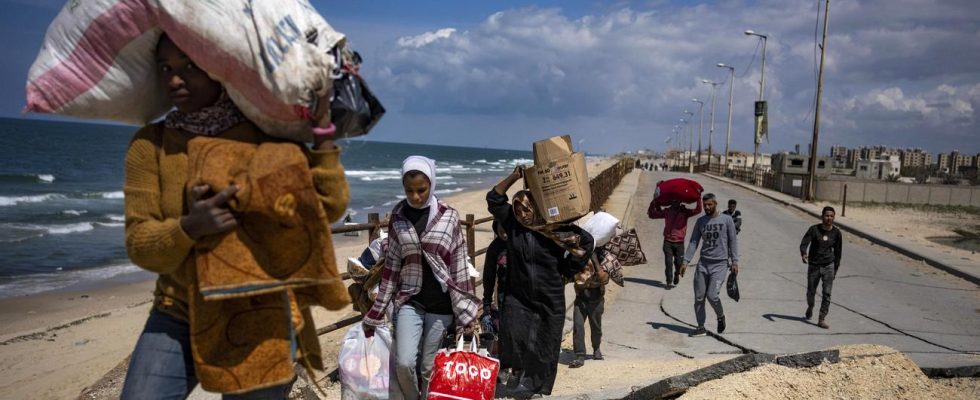Almost six months after the start of the war, the United Nations Security Council called for an “immediate ceasefire” for the first time Gaza Strip required. The Security Council in New York passed a resolution to this effect. A ceasefire is called for until the end of the Muslim fasting month of Ramadan in around two weeks. The resolution also calls on Hamas to immediately and unconditionally release the hostages kidnapped from Israel.
The USA, veto power in the Security Council, abstained from the vote. This enabled the resolution to be adopted. The remaining 14 members voted for the draft. Since the resolution is binding under international law, it increases the pressure on Israel and Hamas.
However, it is questionable whether the Security Council’s decision can actually have an influence on the course of the war. Israeli Prime Minister Benjamin Netanyahu said after the decision World Security Council the planned trip of an Israeli delegation to the USA.
US State Department calls travel cancellation regrettable
Even before the vote, he had threatened to cancel the trip if the USA did not veto the resolution. Originally, the Minister of Strategic Affairs, Ron Dermer, and Israel National security advisor Zachi Hanegbi should fly to the USA. There they wanted US government representatives to present alternatives to Israel’s planned ground offensive on the south of the Gaza Strip. The plans for this are criticized by the USA and other allies of Israel.
The fact that Prime Minister Benjamin Netanyahu canceled the trip was “surprising and regrettable,” said the US State Department. The agency called a large-scale Israeli invasion of Rafah a mistake that would weaken Israel’s security.
Hamas welcomed the UN decision, but underlined that it itself calls for a permanent ceasefire and the withdrawal of Israeli forces from the Gaza Strip. “We confirm our willingness to participate in a process for an immediate prisoner exchange that will lead to the release of prisoners on both sides,” the terrorist organization said. However, under the said “prisoner exchange” the Islamists mean the release of a large number of Palestinians imprisoned in Israel in exchange for hostages.
Previous resolutions failed due to resistance from the USA
Efforts to get the UN Security Council to demand one Truce had so far failed mainly due to resistance from the USA. Since the beginning of the Israeli offensive, the US government, as Israel’s closest ally, has repeatedly opposed a ceasefire.
However, in view of the high number of civilian deaths and the threat of famine in parts of the Gaza Strip, the US government recently changed course and increased pressure on Israel. US President Joe Biden has also become increasingly critical, for example with regard to Israel’s planned ground offensive in the city of Rafah in the south of the Gaza Strip.
Last Friday, the US government finally called for “an immediate and permanent ceasefire” for the first time in a resolution, which Russia and China vetoed. The draft resolution did not go far enough for the two veto powers – in their eyes, the text was too pro-Israel and not binding enough.
Germany, among others, reacted favorably to the resolution that has now been passed. Foreign Minister Annalena Baerbock (Greens) said on the sidelines of a visit to Jerusalem that she was “relieved about the adoption of the resolution because every day counts.” This applies to both the Israeli hostages held by Hamas and the starving people in the Gaza Strip. Baerbock had previously reiterated her demand for an immediate ceasefire and also opposed plans for a Rafah offensive.
Sanctions against Israel are considered unlikely
The resolution now adopted focuses on the call for an “immediate ceasefire for Ramadan, respected by all sides.” This should lead to a “permanent and sustainable ceasefire,” the text says. In addition, the “great concern regarding the catastrophic humanitarian situation in the Gaza Strip” is emphasized. Aid deliveries to the civilian population must be expanded.
The resolution was introduced by the ten current non-permanent members of the Security Council. A vote planned for Saturday was postponed at short notice to gain more time for negotiations.
To be adopted, a resolution in the Security Council requires the votes of at least nine of the 15 member states. In addition, there must be no veto from the permanent members USA, Russia, China, France and Great Britain. Decisions of the committee are binding under international law. If they are ignored, the committee can impose sanctions. In the case of Israel, however, this is not likely due to the veto power of the USA.
Almost six months after the start of the war, the United Nations Security Council called for an “immediate ceasefire” for the first time Gaza Strip required. The Security Council in New York passed a resolution to this effect. A ceasefire is called for until the end of the Muslim fasting month of Ramadan in around two weeks. The resolution also calls on Hamas to immediately and unconditionally release the hostages kidnapped from Israel.
The USA, veto power in the Security Council, abstained from the vote. This enabled the resolution to be adopted. The remaining 14 members voted for the draft. Since the resolution is binding under international law, it increases the pressure on Israel and Hamas.

